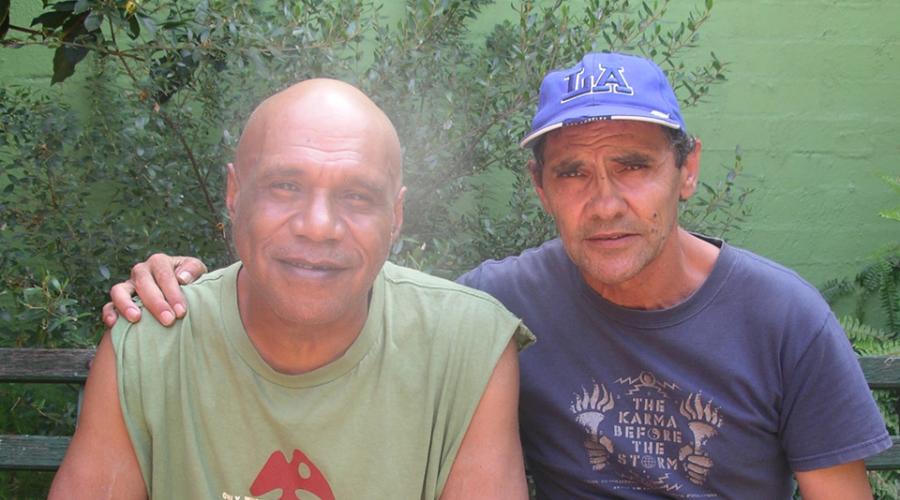Bunjileenee Robbie Thorpe

Fire First ignited on the 3CR airwaves in April 2004 as a unique program for 3CR, being an Indigenous and non-Indigenous collaboration looking at colonialism and activism towards justice. Since then it has served to fill a void in the mainstream media of an Aboriginal activist point of view, as well as serving to broadcast a developing conversation between co-presenters, guests and talk-back callers from both a black and white perspective.
Robbie Thorpe, a well-known Gunai/Mara campaigner, initiated the program with Clare Land, after appearing on 3CR’s Tuesday Breakfast program, which Clare co-presented at the time. Robbie also asked his long-time non-Indigenous comrade Fantom to join in co-presenting the new program.
Throughout 2005 and 2006 Fire First supported and fed into the Black GST- the campaign to end Genocide, recognise Sovereignty and make Treaty, in which Robbie, Clare and Fantom were all involved. For Fantom, “The whole country is based on the premeditated and ongoing genocide of Indigenous people by the Australian government”. For the British Crown to gain access to land without a treaty they needed to take the view that the land was Terra Nullius and Indigenous people were subhuman. Indeed the Australian lingo ‘Blood Oath’ has its origins, according to Fantom, in genocide. Around 1852 the Victorian government stopped recording the massacre of Indigenous people in an attempt to pretend to the British Crown that Aborigines were being treated fairly. People then ‘signed the blood oath of silence’ regarding massacres.
Fantom became involved in Indigenous campaigns in 1992.Tears were in his eyes as he listened to Keating’s landmark Redfern speech. For the first time a politician was admitting the fact of genocide against Indigenous Australians. Like many Australians, Fantom thought that Keating’s speech was going to be a turning point in the Australian government’s approach to Indigenous issues.
Keating’s Native Title Act quickly followed. An extremely complicated piece of legislation, the Native Title Act proved not to be the progressive legislation that many were hoping for. It was in fact the weakest form of land tenure under British law. As Robbie says, Native Title is weaker than a pastoral lease, which is for the foreign animals introduced by white settlers. Conservative State Premiers worked against the Act. The Land Titles Validation Act 1994 brought in by former Victorian Premier Jeff Kennett made sure claims over much of Victoria would be impossible.
Fantom sees Fire First as having a crucial educational role. He is astounded at the apparent ignorance of high school students recently interviewed about Indigenous people, many of whom reportedly wondered which country Aborigines came from. In this context, how are the majority of Australians to understand the struggle for Indigenous rights?
In 2006, as the Black GST’s action around the Stolenwealth Games grew into a major occupation of King’s Domain in central Melbourne, Fire First presented several live broadcasts, and a daily update from Camp Sovereignty. The Stolenwealth Games offered the ideal opportunity for the oppression of Indigenous people in Australia to be revealed to the wider world. Indigenous activists and supporters camped in the Domain Gardens and brought the Sacred Fire from Lake Eyre and the Aboriginal Embassy in for the duration of the Games and beyond. They wanted to educate the public around the issues of the Black GST.
The Fire and the Camp were a major challenge to the Victorian government, begging the question of whether Aboriginal ceremonies are legal or not under our legal system, and representing an independent Indigenous presence on Indigenous terms. These bold acts drew the ire of the authorities, revealing that colonialism is a current, active and violent force. Camp Sovereignty elicited a lot of attention from the international press - much more interest than from the Australian press. Robbie was the spokesperson for the Camp. The Sacred Fire burned for 60 days until the Victorian Government and the Melbourne City Council forcibly extinguished it. An anniversary BBQ at King’s Domain on March 12 this year saw the fire rekindled, showing that the flame of resistance hasn’t been put out.
The camp activists are currently in dialogue with the City of Melbourne about creating a permanent cultural centre for the sacred site of King’s Domain. Under the Victorian Human Rights Charter, Aboriginal people have rights to practice their religion so there is now a question as to whether the police, who acted to extinguish the ceremonial fire, acted illegally.
For Fantom, Indigenous oppression is “the most fundamental issue facing not just Australia but the world. For over 200 years Australia has been an international precedent for what nations can get away with in terms of invading other people’s land”. Unlike the invasion of South America, Australia was invaded when international law had established rules of colonisation and rules of law – rules that were flouted in the case of Australia. Fantom also believes that because the Australian population is comprised of people from nearly every nation on earth, it is deeply symbolic that we are all legitimising a genocidal, illegal regime as Australian citizens if we are not actively campaigning against it.